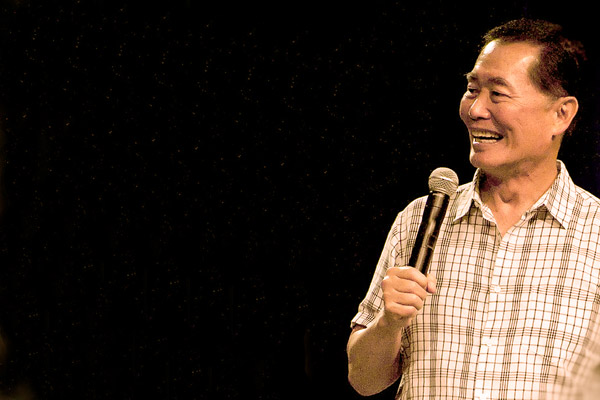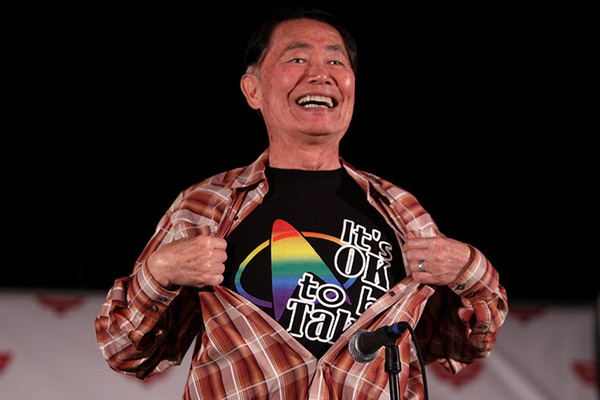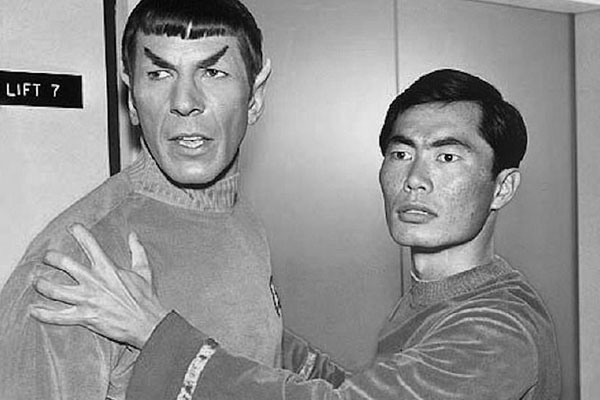
George Takei on Equal Rights, Buddhism, Japanese Internment, and Change
- By Alison Lesley --
- 27 Mar 2015 --

George Takei is widely known as an actor, author, and gay activist. He shared his personal history with Lion’s Roar.
George Takei at the age of 77, he has lived through a lot in terms of change. He and his family made it through the Japanese Internment, a journey that led him to embrace Buddhism as his religion and ideals. He was born to a Buddhist family, a Zen father and a Shin mother. It wasn’t until after Internment that he began to go to temple, along with his siblings. He recalls one particular metaphor his Sunday School teachers used that really stuck with him: We are all part of it, we belong to this vast oneness.

Growing Up and Coming Out
As a child, around the age of 9, he knew he was “different” in his feelings for boys. He lived a double life through his teen years, and kept his secrets close to his chest, thinking he was alone. “When you grow older though, you see that you’re not the only one.” A new fear gripped him: the police regularly conducted raids on gay bars. They would force them out, take them to the station, fingerprint them and keep a list of names. “It was bullying and intimidation of the worst kind.”

Leonard Nimoy with George Takei on the set of Star Trek.
Come 1969, Takei saw real change. It was just after the TV show, Star Trek, was canceled. A raid was staged at The Stonewall Inn, a gay bar in New York’s Greenwich Village. However, the customers fought back with everything they could, calling for supporters, who threw bricks and trash cans. It was the beginning of the Gay Liberation Movement.
“It was very difficult; I shared the anger my peers had. But I was still pursuing my acting career, still silent, gritting my teeth.” Takei felt he couldn’t come out, believing it would have been “career suicide.”
George Takei on Buddhism, coming out, and embracing diversity. Via @LionsRoarOnline http://t.co/scppgvbSLK
— Sacred Matters (@SacredMatters) January 30, 2015
In 2005, both houses of Legislature in California passed the Marriage Equality bill. Yet Arnold Schwarzenegger vetoed the bill, despite the fact he had acquired his position by announcing his love for the gays and lesbians of the world. Takei and Brad both agreed they needed to be public about their anger. That was the first time Takei talked to the press as a gay American, rather than an actor, and he used his moment to announce his outrage at Schwarzenegger.
In 2008, the Supreme Court of California ruled for marriage equality. Brad and George had their wedding at the Japanese American National Museum in the Democracy Forum building, as it “was, after all, democracy that made our formal union possible.” Their marriage was a hodgepodge of diversity. The best man was a Jewish American, Walter Koenig, who played Chekhov on Star Trek. Nichelle Nichols, Uhurua, was their best lady, an African American woman.
On Internment and Activism
George Takei spent his youth looking into Internment, however found little on the subject in his history books. He was close with his father, who he frequently challenged. His father shared his wisdom in return. “He said that ours is a people’s democracy, and that it can be every bit as great as we are – but also infallible. It is vitally dependent on good people who believe in the ideals of democracy: that all people are created equally and have unalienable rights to life, liberty and the pursuit of happiness.”
Takei was introduced to politics by his father, who volunteered him in the electoral process. Takei quickly became an activist for social justice, and was involved in Civil Rights and the peace movement during Vietnam. He took part in the Redress campaign of the 70s. It amazes him how far we have come these years.
“We can all bring about change. We can bring about greater equality for all, and that, I feel, is part of the mission of Buddhism.”



















